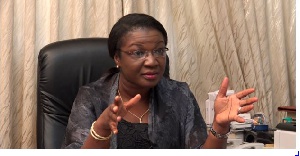Opinions of Thursday, 28 September 2023
Columnist: Evans Mawunyo Tsikata
The evolving landscape: Exploring the dynamics of educational management in Ghana
Education has long been a priority in Ghana's development agenda. As the country continues to evolve and adapt to the changing global landscape, the dynamics of educational management have become increasingly intricate and diverse. In recent years, there have been significant changes and revolutions in Ghana's educational environment.
As the emphasis on excellent education and inclusive practices has expanded, the dynamics of educational management have become more obvious. The goal of this essay is to look into the changing landscape of educational management in Ghana by looking into the historical context, policy framework, and problems and opportunities that make up this dynamic profession. By delving into the various areas of educational management, we may have a better understanding of how Ghana is attempting to attain its educational goals.
Education is critical to the socioeconomic success of any country. Educational management in Ghana has developed over time to meet the changing demands and aspirations of society. Ghana's educational management may be traced back to the colonial era when the British built the Gold Coast's first formal education system (pre-independence Ghana). At the time, the goal of education was to produce a trained workforce to serve the colonial government and local nobility.
Following Ghana's independence in 1957, educational management saw substantial changes as the country strove to build its educational system.
The government implemented several initiatives and reforms aimed at increasing educational access and strengthening national identity. Ghana's educational management policy framework is principally directed by the Education Act of 2008, with subsequent updates and modifications. The act prioritizes quality education, equity, and inclusion, as well as the promotion of lifelong learning.
As the policy framework has laid the groundwork for educational administration in Ghana, there are numerous advantages and disadvantages to consider. One of its strengths is its emphasis on free basic education, which has considerably increased access to education for the most needy people. In addition, there is a focus on quality assurance and monitoring to ensure that effective education is offered. However, the policy system has serious problems. A lack of sufficient funds is one hindrance to the implementation of many projects and initiatives. Furthermore, because rural towns typically have limited infrastructure and resources, a comprehensive approach to bridging the gap between urban and rural schools is required.
Ghana has made tremendous progress in boosting educational attainment and extending educational access. To address the issues that the education system faces, the government has developed several policies, including the Free Senior High School policy, which aims to provide free secondary education to all Ghanaian students. This policy has expanded enrollment while minimizing family financial commitments. Furthermore, the government has focused on teacher training and professional development to improve educational quality.
Efforts have been made to improve the curriculum and teaching methods, with a focus on helping students develop their critical thinking, problem-solving skills, and creativity.
Apart from government measures, several non-governmental organizations and international partners are striving to help Ghana's educational management. These organizations provide financial aid, technical help, and capacity building to strengthen the education system and meet the needs of disadvantaged groups such as girls, disabled children, and rural residents.
Despite these hopeful accomplishments, Ghana's educational management still faces significant challenges. One of the most pressing concerns is the issue of instructor quality and motivation. Many Ghanaian teachers are underpaid, receive inadequate training, and have limited resources, all of which have an impact on the quality of education they provide.
Addressing these concerns and improving teacher well-being is crucial for the overall success of the educational system. Another concern is the digital divide, which is particularly common in rural areas. Despite efforts to integrate technology into education, many rural schools lack access to reliable internet connectivity and digital tools. Bridging the digital divide is essential for ensuring that all students have equitable access to a high-quality education.
In conclusion, educational management in Ghana has developed over time to accommodate the changing needs of society. The policy framework is an excellent starting point for good management, but there are certain obstacles to overcome. By recognizing these difficulties and working toward innovative solutions, Ghana may continue to improve its educational system and increase its people capital for long-term prosperity.
The evolving global landscape, as well as the rising emphasis on quality education, have highlighted the need for innovative and adaptable educational management systems. The shifting landscape of educational management in Ghana demonstrates a deep commitment to addressing the myriad issues associated with providing excellent education to all.
By delving into the historical trajectory, policy framework, and various approaches utilized to promote inclusive practices and achieve educational goals, we have gained a stronger respect for the efforts being made in Ghana to construct an inclusive and sustainable educational system.
Click here to start the nomination process for the 2023 GhanaWeb Excellence Awards













